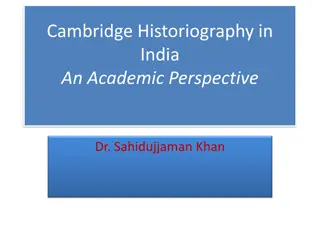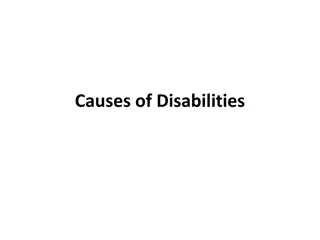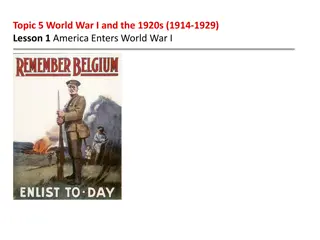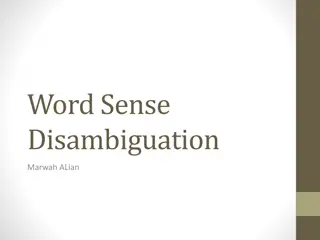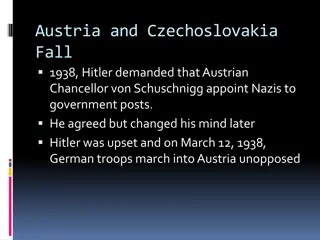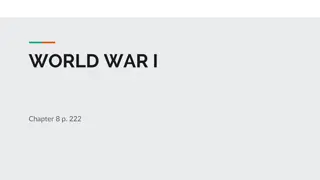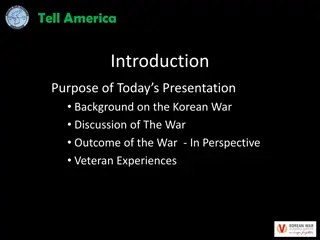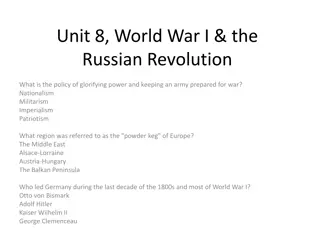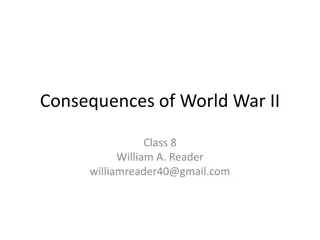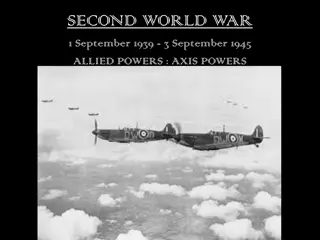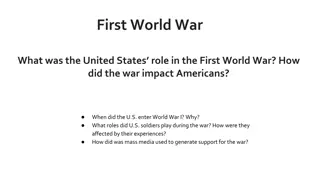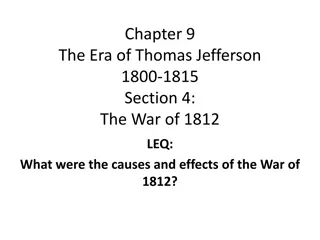Approaches to the Causes of World War I: Historiography Overview
Explore various historical perspectives on the origins of World War I, from the blame placed on Germany in the Treaty of Versailles to the revisionist and anti-revisionist interpretations that emerged post-World War II. Delve into differing views on nationalism, imperialism, militarism, and alliances that shaped these interpretations.
Download Presentation

Please find below an Image/Link to download the presentation.
The content on the website is provided AS IS for your information and personal use only. It may not be sold, licensed, or shared on other websites without obtaining consent from the author.If you encounter any issues during the download, it is possible that the publisher has removed the file from their server.
You are allowed to download the files provided on this website for personal or commercial use, subject to the condition that they are used lawfully. All files are the property of their respective owners.
The content on the website is provided AS IS for your information and personal use only. It may not be sold, licensed, or shared on other websites without obtaining consent from the author.
E N D
Presentation Transcript
Cwk Historiography of the causes of the First World War These tasks will help you to: Learn about the different types of approaches to the causes of WWI Consider how these approaches apply to the historians you will be using for your coursework Learning objectives: AO1: Demonstrate knowledge and understanding about the build up to WWI. AO3: Use as part of a wider enquiry into interpretations of the causes of WWI.
Historiography Copy and complete the table about the different types of historical thinking. School of thought View Context Proponents
The Treaty of Versailles Immediately after the war, of course, the victorious nations agreed that Germany was the cause of the war. Article 231 of the Treaty of Versailles the famous 'war guilt' clause said so. Article 231 of the Treaty of Versailles The Allied and Associated Governments affirm and Germany accepts the responsibility of Germany and her allies for causing all the loss and damage to which the Allied and Associated Governments ... have been subjected as a consequence of the war imposed upon them by the aggression of Germany and her allies.
Revisionist During the 1920s and 1930s, the anger cooled. In addition, a special section of the German Foreign Office the War Guilt Section published all the German official foreign policy documents from before the war (thirty-nine volumes of them), in an attempt to prove that German was not guilty of starting the war. Other governments (even the Russians) followed suit. During the 1930s, 'revisionist' historians sought to revise the view of German responsibility for the war. Marxist (Communist) historians believed that the War was the result of the competition of capitalist businessmen, and emphasised the role played by Imperialism. Other historians blamed the politicians: declaring that diplomacy before the war was bankrupt of ideas and men of ability, they blamed the leaders. In his War Memoirs, the British Prime Minister seemed to accept some blame. Many revisionist historians favoured an explanation of the war as being caused by powerful forces that were pushing Europe into war - nationalism, imperialism, militarism and the system of alliances. The most important of these historians was the American historian Sydney Bradshaw Fay.
Anti-Revisionist (sole German blame) The Second World War changed historians views of the First World War. Faced by the phenomenon of an Adolf Hitler, the 'Anti-revisionists' tended to return to the idea of German responsibility. In Britain, the historian A.J.P. Taylor wrote a book called The Struggle for Mastery in Europe, in which he claimed that German ambitions caused the conflict. About the same time, a book by the Italian journalist Luigi Albertini s The origins of the War of 1914 became available in English. Albertini's ideas supported AJP Taylor's in as much as he believed that the primary responsibility for the war lay with Germany's plan of mobilisation. Unlike other countries' mobilisation plans, the Schlieffen Plan was offensive, and meant that, when Germany mobilised, Germany went to war.
Anti-Revisionist (sole German blame) Most of all, Taylor was supported by the German historian Fritz Fischer, who in his books Grasp for World Power (1961) and War of Illusions (1969) argued that: 1. there was a 'will to war' amongst the leaders of Germany, 2. the German government wanted events to slide into war in 1914, 3. the German government had a plan of expansion very similar to that of Nazi Germany in the 1930s, 4. this was as a result of social and economic factors inside Germany - the ATTITUDE of Germans - as much as it was the result of any fears about foreign policy or the international scene. Fischer's ideas had such a huge effect on historical scholarship that nowadays, the anti-revisionist period is sometimes called 'the Fischer revolution'. At first, Fischer was fiercely attacked for his ideas - especially by German historians - but he defended his views, and nowadays most historians accept that the German leaders (particularly the military upper classes; the Junkers) were particularly aggressive in the years before 1914, and that this destabilised international politics. German leaders reckoned that they had the military initiative, but that if they waited too long they would lose their superiority to the growing power of Russia. In this sense, Moltke's comment - 'we are ready, and the sooner the better for us' - sums up the German attitude in 1914.
Anti-Revisionist (a Will to War) Although most modern historians allocate some or most of the blame to Germany, further studies have revealed that there was just as much 'will to war' in other countries. In 1991, the British historian Samuel Williamson, in his book, Austria-Hungary and the Origins of the First World War, argued that Austria-Hungary was equally to blame for the war, marrying a German expansionism with an Austrian desire to expand into the Balkans. Other historians cited militaristic/bellicose attitudes in France and Britain. This led some historians after the 1970s to return to Winston Churchill's suggestion that war came in 1914 because of a general restlessness throughout Europe, in which everybody was turning to violence as a way of sorting out their dissatisfactions (for instance, the suffragettes, the trade unions, and both Catholics and Protestants in Northern Ireland, started to use force in the years before 1914).
Post-1980s Most recently, some historians have been drawing attention also to the feeling in Austria- Hungary and Russia that, somehow, a war might be the solution for their own internal troubles. The ruling classes of Russia and Austria-Hungary hoped that a war would help them to get back control of their people, and forge a new unity. According to Annika Mombauer in 2015, a new consensus among scholars had emerged by the 1980s, mainly as a result of Fischer s intervention, Few historians agreed wholly with his [Fischer's] thesis of a premeditated war to achieve aggressive foreign policy aims, but it was generally accepted that Germany s share of responsibility was larger than that of the other great powers . Regarding historians inside Germany, she adds that by the 1990s, There was 'a far-reaching consensus about the special responsibility of the German Reich' in the writings of leading historians, though they differed in how they weighted Germany s role.
Historiography For each of the interpretations, explain its main argument about responsibility for WWI and which school of thought it belongs in.
R.J. Unstead, A Century of Change (1963) The situation in Europe had been dangerously tense for more than thirty years, Germany, ever stronger and more pugnacious, was detested by the French... Kaiser William II, the arrogant young Emperor, [followed] a policy based on strength instead of caution. Convincing himself that Germany was being denied her rightful 'place in the sun', the Kaiser embarked upon a vast programme of military and naval armament. For mutual protection, therefore, France and Russia drew closer together ... The German Emperor, who had neither brains nor manners, seemed to go out of his way to give and to take offence. He wrote rudely to his grandmother [Queen Victoria], openly sided with the Boers, and told Britain to mind her own business in Egypt instead of complaining about German plans to build a railway from Berlin to Baghdad. Above all, he built a powerful battle-fleet which could only be intended to challenge British sea-power. In this situation Britain could not afford to remain isolated, and . . . Balfour made an approach to France. . . (Balfour was Prime Minister of Britain 1902-5.)
Emil Ludwig, July 1914 (1929) A peaceable, industrious, sensible mass of 500 million [European people], was hounded by a few dozen incapable leaders, by falsified documents, lying stories of threats, and chauvinistic catchwords, into a war which in no way was destined or inevitable. David Lloyd George (1934) We muddled into war. A.J.P. Taylor, The Struggle for Mastery in Europe (1954) [The German] bid for continental supremacy was certainly decisive in bringing on the European War ...
R. Henig, The Origins of the First World War (1989) What really marked out the decade before 1914 was a failure of statesmanship and hope. By 1912, most European governments had come to believe that a general European war was inevitable and that the problems which plagued them at home and abroad could no longer be settled by negotiation and diplomacy In these circumstances, war seemed to offer an attractive way out ... The balance sheet in 1918 proved how wrong they had been.
J. M. Roberts in History of World War One (1978) One of the most surprising features of the reception of the news of the war was the enthusiasm shown not only by the half-educated and [nationalistic] masses, but by intellectuals, too Running through such responses was the deliberate cultivation of values and qualities directly opposed to those of the liberal civilization of the day... One spectacular example was the French engineer-turned-philosopher, Georges Sorel. His work, Reflections on Violence (1908), attributed all great achievements to violence... It is not, therefore, in the diplomatic documents, or the plans of the war offices that the whole story of the origins of the war can be found. When they have been [read], there still remain important questions about mass psychology and spiritual weariness to be answered before we can confidently say how so great a conflict came about.


